Retired Vice Adm. Robert Harward has turned down President Donald Trump’s offer to become his new national security adviser, according to two people with knowledge of the decision.
Harward would have replaced Michael Flynn, who announced his resignation late Monday amid allegations that he discussed U.S. sanctions with a Russian official before Trump took office and then misrepresented the content of that conversation to Vice President Pence and other administration officials.
One factor in Harward’s decision was he couldn’t get a guarantee that he could select his own staff, according to someone close to Trump with knowledge of the discussions.
Other officials said his decision was motivated by financial concerns about leaving his job at Lockheed Martin, the aerospace firm where he now a senior executive, and the impact it would have on his family.
One senior U.S. official said that “family considerations changed his mind.” A friend of Harward’s added the former Navy SEAL was also not fully comfortable with the quickly moving process. All requested anonymity to discuss the sensitive matter.
The news of Harward’s decision was first reported by The Financial Times.
The administration had hoped to name Harward to the position this week, in an effort to soothe the turmoil rolling through the White House. Even before Flynn resigned, the administration was quietly wooing Harward. The hard-charging former Navy SEAL was at the White House on Feb. 8 and then again this week, according to an administration official. Harward commanded high-risk operations in Iraq and Afghanistan and later parachuted into his own retirement ceremony from high altitude.
Trump suggested at a news conference Thursday that one of the reasons he felt he could let Flynn go was because he had a good replacement in mind, without naming that person.
“I have somebody that I think will be outstanding for the position,” he said. “And that also helps, I think, in the making of my decision.”
Harward’s decision not to take the job leaves the White House scrambling to find a leader for the security council, which is struggling to get its bearings.
Most National Security Council staffers are traditionally on temporary duty from the Defense and State departments and the intelligence agencies, but as many as 60 slots are vacant, according to senior officials who denied reports that the White House is having trouble recruiting to fill them. They said the vacancies are due to rotational and turnover delays in what are normally two-year assignments.
The White House hires about 75 of a total of more than 200 staffers on the council. The staff chosen by Flynn is heavily weighted toward the small world of military intelligence officials or strategists who rotated through Iraq and Afghanistan with him over the past decade.
Send questions/comments to the editors.



Success. Please wait for the page to reload. If the page does not reload within 5 seconds, please refresh the page.
Enter your email and password to access comments.
Hi, to comment on stories you must . This profile is in addition to your subscription and website login.
Already have a commenting profile? .
Invalid username/password.
Please check your email to confirm and complete your registration.
Only subscribers are eligible to post comments. Please subscribe or login first for digital access. Here’s why.
Use the form below to reset your password. When you've submitted your account email, we will send an email with a reset code.